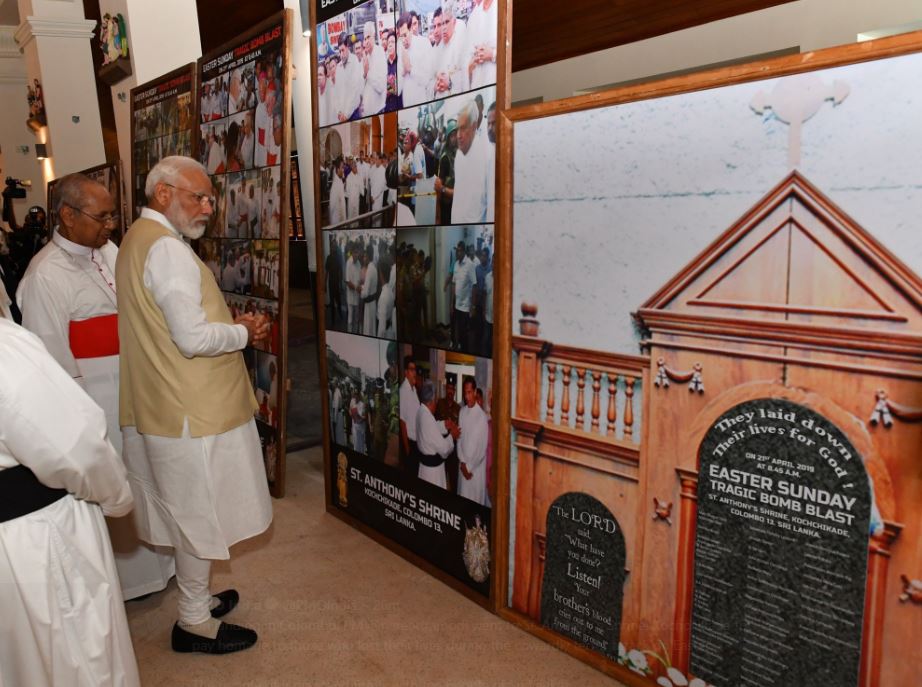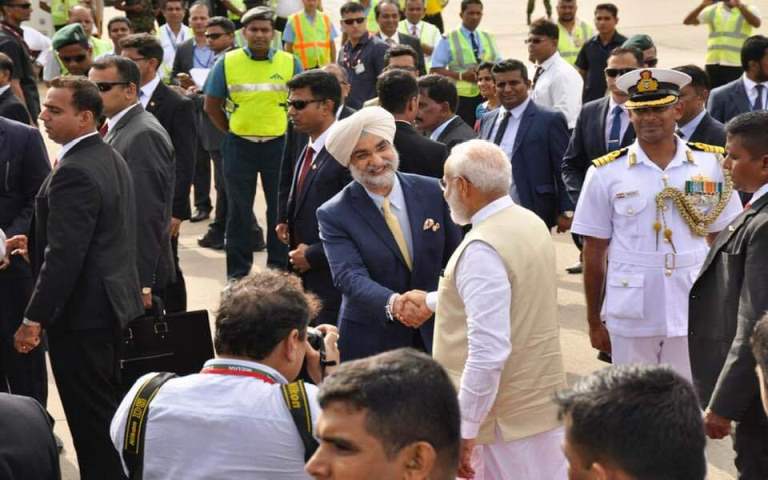Colombo, June 10 (newsin.asia): During Indian Prime Minister Narendra Modi’s visit to the Maldives and Sri Lanka from June 7 to 9, it was clear that the vibes between Modi on the one hand, and the leaders of the Maldives and Sri Lanka on the other, were exceptionally good.
Sri Lankan President Maithripala Sirisena even held an umbrella for Modi when there was a sudden shower at the formal open-air reception. And at the end of the visit, Sirisena tweeted:
“Thank you @narendramodi, for your brief, but highly productive visit to our country today, thus proving you are a true friend of ours. I highly appreciate and value your kind gesture, support and cooperation extended to Sri Lanka”.
In Male, Modi was given the highest Maldivian award – Rule of Nishan Izzuddeen. ’
Modi’s substantial aid package to the Maldives and his assurance to Sri Lanka that India would stand four square behind it in its fight against Jehadi terrorism, were much appreciated. He had addressed the felt needs of the two countries.
However, the proof of the pudding is in the eating. The devil is in the implementation of the projects envisaged by the leaders. There ought to be actual and consistent cooperation between India and Sri Lanka at the official and line department levels to make the laudable intentions a reality.
To take the latest example of “cooperation”, namely, intelligence sharing between India and Sri Lanka. Between April 4 and the day of the suicide bombings on April 21, India had given the Sri Lankan security agencies three successive warnings of suicide attacks, and yet, no action was taken either by the law and order machinery or by Lanka’s political leaders.

After the blasts which took more than 250 lives, a top official said that his subordinates did not properly categorize the intelligence input. It was said that the President and Defense Minister Maithripala Sirisena had told a key official that he would entertain intelligence inputs only from a particular outfit. The President often did not invite top security officials to meetings of the National Security Council where warnings of the attacks could have been discussed.
Therefore, despite the existence of very precise intelligence inputs from India, the Sri Lankan official and political systems were found wanting and the blasts were not prevented.
Lanka Drags Its Feet on Agreed Projects
On 25 April, 2017 India and Sri Lanka signed a number of M0Us on industrial, economic and agriculture projects to be implemented as per a set timetable. But most of the projects did not take off because the Sri Lankan political leadership and officialdom were dragging their feet or had other plans.
Some of the key projects which had stopped in their tracks are:
Building a re-gasified LNG-fired 500 megawatt capacity power plant in Kerewelapitiya near Colombo; an LNG Terminal/Floating Storage Regasification Unit (FSRU) in Kerawalapitiya; a piped gas distribution system; and conversion of liquid fuel-based power plants to R-LNG fired plants.
Building a 50 MW (extendable to 100 MW) solar power plant in Sampur in the Eastern Province. The 84 giant oil tanks in the Upper Tank Farm in Trincomalee were to be “jointly developed” by the Lanka Indian Oil Corporation (LIOC) and the Ceylon Petroleum Corporation (CPC), with India giving up many privileges it had as per the 2003 agreement which gave it full ownership.

Building a port, a petroleum refinery and other industries in Trincomalee, as a joint venture. Development of an Industrial Zones or Special Economic Zones in identified locations. Submission of a list of road projects to be considered for joint development. Development of the Mannar-Jaffna and Mannar-Trincomalee highway; and the Dambulla-Trincomalee Expressway. Building a Container Terminal in Colombo Port as a Joint Venture.
With Sri Lanka showing little of no commitment to these projects, Indian Prime Minister Modi said that India does not want to push any projects down the throats of Sri Lanka, that the projects would be chosen by Sri Lanka and those will be implemented as per the speed desired by Sri Lankans.
The ball is, therefore, in the Sri Lankan court.

Maldives
In the Maldives, President Ibrahim Mohammad Solih pledged that his country would always remain a “faithful and true friend of India”.
The visa facilitation agreement signed last December during President Solih’s maiden trip to India is now being implemented. The new arrangement has eased travel between the two countries.
A Coastal Surveillance Radar System and the Composite Training Center were inaugurated last Saturday. The ferry link between Cochin, Kulhudhufushi and Male which is to be established, would be of great benefit to businesses, tourists and cargo transportation. President Solih hoped that the project would be implemented at the earliest.
A thousand Maldivian civil servants will be trained in five years under an MoU signed on Saturday, while customs officials will undergo training for capacity building under a second MoU.
Expressing appreciation to the Prime Minister for the financial support extended to the Maldives in the forms of budgetary support, T-bills, currency swap and Lines of Credit, President Solih said the government has already received budgetary grants as well as subscription through T-bills.
Both countries are working towards implementing projects financed under an Indian Line of Credit at the earliest, Solih said.
However, for these projects to succeed, the Maldivian leaders and bureaucrats would have to show the same commitment leaders and officials showed when President Abdullah Yameen was in power till November 2018.
Yameen ruled with an iron hand and projected himself as a “doer”. Under him ministers and officials were responsive, alert and quick to act. Chinese companies which have interacted with both the Yameen and Solih governments have noticed a difference. They complain of a lack of responsiveness and drive now as compared to the past.
This is the complaint of Indian and Chinese companies in Sri Lanka too. Under the stern rule of President Mahinda Rajapaksa, Ministers and officials were responsive and prompt. The Indian aided projects were completed ahead of schedule. But now, the attitude is lackadaisical, and the response is lax, if not obstructive.



























































